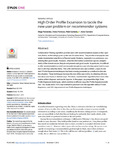High Order Profile Expansion to tackle the new user problem on recommender systems

Use este enlace para citar
http://hdl.handle.net/2183/25687Colecciones
- Investigación (FIC) [1682]
Metadatos
Mostrar el registro completo del ítemTítulo
High Order Profile Expansion to tackle the new user problem on recommender systemsFecha
2019-11-07Cita bibliográfica
Fernández D, Formoso V, Cacheda F, Carneiro V (2019) High Order Profile Expansion to tackle the new user problem on recommender systems. PLoS ONE 14(11): e0224555. https://doi.org/10.1371/journal.pone.0224555
Resumen
[Abstract]
Collaborative Filtering algorithms provide users with recommendations based on their opinions, that is, on the ratings given by the user for some items. They are the most popular and widely implemented algorithms in Recommender Systems, especially in e-commerce, considering their good results. However, when the information is extremely sparse, independently of the domain nature, they do not present such good results. In particular, it is difficult to offer recommendations which are accurate enough to a user who has just arrived to a system or who has rated few items. This is the well-known new user problem, a type of cold-start. Profile Expansion techniques had been already presented as a method to alleviate this situation. These techniques increase the size of the user profile, by obtaining information about user tastes in distinct ways. Therefore, recommender algorithms have more information at their disposal, and results improve. In this paper, we present the High Order Profile Expansion techniques, which combine in different ways the Profile Expansion methods. The results show 110% improvement in precision over the algorithm without Profile Expansion, and 10% improvement over Profile Expansion techniques.
Palabras clave
Filtering algorithms
Recommender systems
E-commerce
Recommender systems
E-commerce
Descripción
Data Availability: The complete dataset for the High Order Profile Expansion experiments has been published in the public repository: https://doi.org/10.6084/m9.figshare.9798155.
Versión del editor
Derechos
Atribución 3.0 España
ISSN
1932-6203






